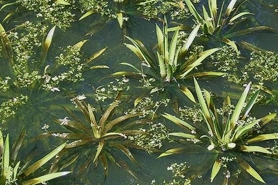Water Soldiers
(Stratiotes aloides)
This is a perennial aquatic plant with sharp serrated leaf edges native to Europe and Asia. It is often used as an ornamental plant and, if released into the wild, could threaten our aquatic ecosystems.
Other names for this plant include:
- Common names: water pineapple, water aloe
- Scientific names: Stratiotes generalis, Stratiotes aquaticus, Stratiotes aculeatus
Classification in Wisconsin: Prohibited
- Ecological Threat
-
- Dense mats of floating vegetation can inhibit other native aquatic vegetation, decreasing biodiversity.
- The plants’ sharp serrated leaf edges can cut swimmers and individuals that try to pull or remove the plants.
- The dense floating mats of vegetation can negatively affect boating, angling and swimming.
- Identification
-
Leaves: Resemble pineapple or aloe leaves, forming a rosette of green leaves 40 cm long, sword-shaped, with sharp spines. In autumn the leaves of the plant secrete a substance that allows it to sink below the water to the bottom of the lake/pond, where it will stay dormant over winter before rising to the surface in spring.
Flowers: Water soldiers have male and female plants; showy flowers are white with three petals. Male plants usually have 3-6 flowers, with female plant inflorescences containing one or two buds.
Fruits & seeds: Rarely produced, female plants can have 1 to 3.5 cm long fleshy berries containing up to 24 seeds. Mature plants produce offsets that increase the spread, much like spider plants.
Roots: Water soldier roots are small and not permanently attached to the substrate. Plants can grow in water depths of up to 5 meters.
Similar species: Although this plant may resemble native plants such as arrowheads or bur-reeds, the sharp serrated leaves and rosette growing habit should quickly distinguish it from other plants.
- Distribution
-
Currently, there have been no reports of water soldiers in Wisconsin. Have you seen it? Please send us a report.
- Control
-
Mechanical: Using a rake or other device is a preferred way of removing the floating plants, which should be bagged and taken to a landfill. If handling, use gloves and wear arm/leg protection to prevent injury from the sharp serrations on leaves.
Chemical: Aquatic-approved formulas of diquat or glyphosate have been used in other countries when the plant vegetation is exposed. The application of aquatic herbicide will require a permit.
- Resources
- Sources for content:
- Ontario’s Invasive Species Awareness Program: Water soldier factsheet [exit DNR]


